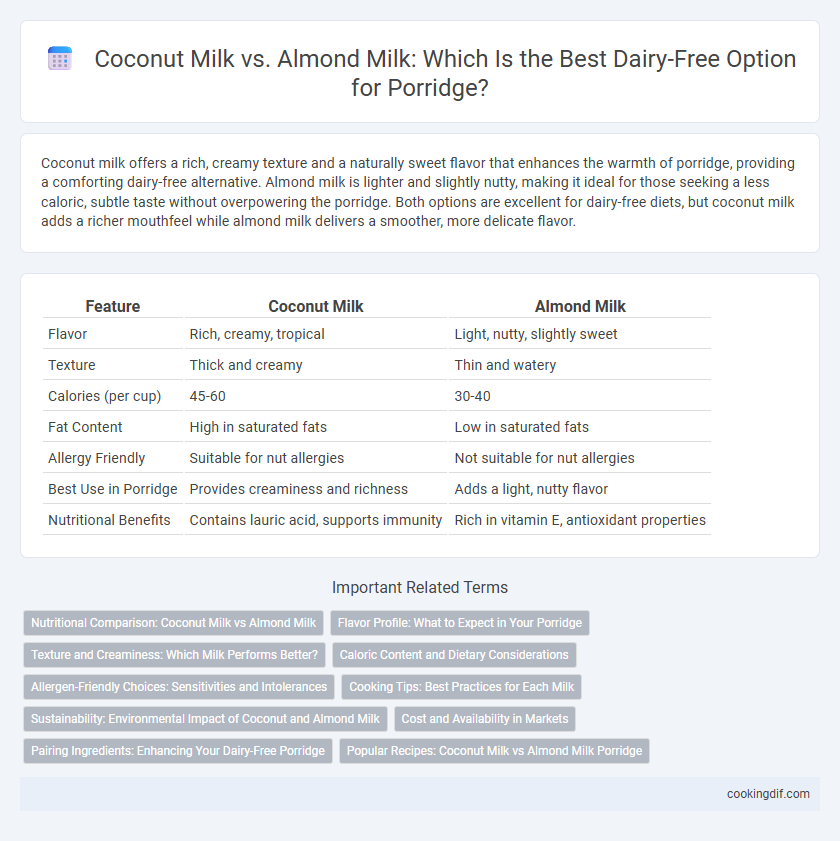Coconut milk offers a rich, creamy texture and a naturally sweet flavor that enhances the warmth of porridge, providing a comforting dairy-free alternative. Almond milk is lighter and slightly nutty, making it ideal for those seeking a less caloric, subtle taste without overpowering the porridge. Both options are excellent for dairy-free diets, but coconut milk adds a richer mouthfeel while almond milk delivers a smoother, more delicate flavor.
Table of Comparison
| Feature | Coconut Milk | Almond Milk |
|---|---|---|
| Flavor | Rich, creamy, tropical | Light, nutty, slightly sweet |
| Texture | Thick and creamy | Thin and watery |
| Calories (per cup) | 45-60 | 30-40 |
| Fat Content | High in saturated fats | Low in saturated fats |
| Allergy Friendly | Suitable for nut allergies | Not suitable for nut allergies |
| Best Use in Porridge | Provides creaminess and richness | Adds a light, nutty flavor |
| Nutritional Benefits | Contains lauric acid, supports immunity | Rich in vitamin E, antioxidant properties |
Nutritional Comparison: Coconut Milk vs Almond Milk
Coconut milk contains higher saturated fat content and provides moderate calories, supporting energy needs, while almond milk is low in calories and rich in vitamin E and antioxidants. Almond milk offers more vitamin E and calcium when fortified, beneficial for bone health and immune support. Coconut milk's medium-chain triglycerides (MCTs) may enhance metabolism, contrasting almond milk's heart-healthy unsaturated fats, making each suitable depending on dietary goals.
Flavor Profile: What to Expect in Your Porridge
Coconut milk offers a rich, creamy texture with a natural sweetness and subtle tropical notes that enhance the porridge's flavor, making it indulgently smooth. Almond milk provides a lighter, nuttier taste with a mild sweetness that complements the grains without overpowering them, resulting in a more delicate porridge. Choosing between these dairy-free options depends on whether you prefer a bold, creamy base or a lighter, nutty profile in your porridge.
Texture and Creaminess: Which Milk Performs Better?
Coconut milk offers a rich, creamy texture that enhances the smoothness of porridge, creating a velvety mouthfeel ideal for those seeking indulgence in a dairy-free option. Almond milk, while lighter and less creamy, provides a slightly nutty flavor that maintains a thinner, less dense texture, making it suitable for individuals preferring a more fluid consistency. The higher fat content in coconut milk generally results in superior creaminess and a thicker porridge compared to almond milk, which tends to produce a more delicate and less luscious texture.
Caloric Content and Dietary Considerations
Coconut milk typically contains higher calories and saturated fats compared to almond milk, making it a richer option for porridge but less suitable for low-calorie diets. Almond milk is significantly lower in calories and fats, ideal for weight management and heart-healthy dietary considerations. Both dairy-free alternatives offer lactose-free benefits, with almond milk providing additional vitamin E and coconut milk contributing medium-chain triglycerides (MCTs) for energy.
Allergen-Friendly Choices: Sensitivities and Intolerances
Coconut milk and almond milk offer allergen-friendly alternatives for dairy-free porridge, catering to those with lactose intolerance or dairy allergies. Coconut milk is naturally free from nuts, making it a safer option for individuals with nut allergies, while almond milk provides a nutrient-rich, low-calorie option but may trigger reactions in nut-sensitive users. Choosing between these milks depends on specific sensitivities, with coconut milk supporting a broader range of allergies and almond milk favored for its vitamin E content and mild flavor.
Cooking Tips: Best Practices for Each Milk
Coconut milk adds a rich, creamy texture to porridge, requiring gentle simmering on low heat to prevent curdling and separation, ideal for a tropical flavor profile. Almond milk offers a lighter consistency, best incorporated gradually with constant stirring over medium heat to avoid graininess while preserving its nutty taste. Selecting unsweetened varieties enhances control over sweetness and allows customization with spices like cinnamon or nutmeg for both dairy-free options.
Sustainability: Environmental Impact of Coconut and Almond Milk
Coconut milk generally has a lower water footprint compared to almond milk, requiring significantly less irrigation, which makes it a more sustainable choice in terms of water usage. Almond milk production heavily relies on water-intensive irrigation, often straining resources in drought-prone regions like California. Choosing coconut milk over almond milk can thus reduce environmental impact by conserving freshwater and limiting agricultural stress.
Cost and Availability in Markets
Coconut milk often comes at a lower cost and is widely available in most supermarkets, making it a budget-friendly dairy-free option for porridge. Almond milk, while generally more expensive, can be found in specialty stores and larger grocery chains, offering a popular alternative with a slightly nutty flavor. Both options provide nutritious benefits, but coconut milk's affordability and market presence give it an edge for everyday porridge preparation.
Pairing Ingredients: Enhancing Your Dairy-Free Porridge
Coconut milk's rich, creamy texture and natural sweetness pair exceptionally well with tropical fruits like mango and pineapple, as well as warm spices such as cinnamon and nutmeg, enhancing the flavor profile of dairy-free porridge. Almond milk offers a lighter, nuttier taste that complements ingredients like berries, chia seeds, and honey or maple syrup, providing a subtle nuttiness without overpowering the dish. Choosing the right milk base can elevate the overall taste and texture, making dairy-free porridge more enjoyable and satisfying.
Popular Recipes: Coconut Milk vs Almond Milk Porridge
Coconut milk porridge delivers a rich, creamy texture and naturally sweet flavor, enhancing tropical or spiced recipes like mango coconut porridge or cinnamon-infused bowls. Almond milk porridge offers a lighter, subtly nutty taste ideal for pairing with berries, chia seeds, and honey for a refreshing dairy-free breakfast. Popular recipes often choose coconut milk for indulgence and almond milk for a delicate, nutrient-rich alternative.
Coconut milk vs Almond milk for dairy-free option Infographic

 cookingdif.com
cookingdif.com